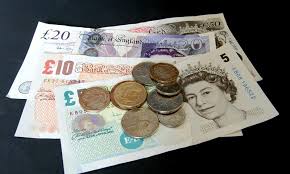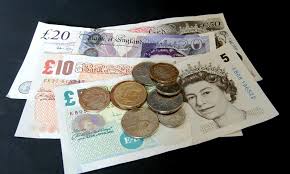
Driven by computer-initiated sell orders that left the pound at a fresh 31-year-low and heading for its worst week since January 2009, Sterling lost a tenth of its value in minutes on Friday, in what traders said was a "flash crash".
As anxiety grows that Britain will opt for a "hard" exit from the European Union, the pound has been under pressure for most of this week. From levels around $1.2600, it dived about 10 percent to $1.1378 in a matter of minutes in thin early Asian trade on Friday.
After it appeared Prime Minister Theresa May had opted for a tougher exit from Europe, the drop in Asia came after French President Francois Hollande said the EU needed to remain firm with Britain. Investors were left fretting about the pound's future due to the hardline stance from both parties.
"Of course, some in the market may see sterling's overnight volatility to be the result of French President Hollande demanding tough Brexit negotiations. The new British government under May appears to have chosen an economic course which could bear substantial risks," said Hans Redeker, head of currency strategy at Morgan Stanley.
While still down 2.7 percent on the day, Sterling recovered and was last fetching $1.2275. Before easing to 90.66 pence, up 2.5 percent, the euro also rose to 94.03 pence, its highest since early 2009. All of which saw the sterling trade-weighted index down 1.6 percent at 74.7, its lowest since January 2009.
Due to worries about May's comments on loose monetary policy, which some saw as a thinly veiled attack on the Bank of England and about how Britain will exit the EU, global markets have been on edge in recent days.
A hard Brexit, where Britain gives up full access to the single market in order to impose full control on its borders, is what May's government is leaning towards, believes many investors. The foreign investment needed to fund Britain's huge current account deficit, one of the biggest in the developed world, could get constricted and trade could be hindered, some fear. The pound is forecast to drop to $1.10 and parity against the euro by the end of 2017 by HSBC on Friday.
"The pound used to be a relatively simple currency that used to trade on cyclical events and data, but now it has become a political and structural currency. This is a recipe for weakness given (Britain's) twin (budget and current account) deficits," HSBC's global head of FX research David Bloom said.
Traders, including computer-driven algorithms, would be spooked as the Sterling is set for a weekly loss of 5.4 percent, trading below the psychological $1.25 mark and removing various technical support levels on the move lower.
"Once the pound started moving lower, then more technical algos could have followed suit, compounding the short, sharp, selling pressure," said Kathleen Brooks, research director at City Index. "Thus, the pound has been the victim of the digital, headline-driven world that we live in. For sterling, algorithms have become the modern-day version of a George Soros."
(Source:www.reuters.com)
As anxiety grows that Britain will opt for a "hard" exit from the European Union, the pound has been under pressure for most of this week. From levels around $1.2600, it dived about 10 percent to $1.1378 in a matter of minutes in thin early Asian trade on Friday.
After it appeared Prime Minister Theresa May had opted for a tougher exit from Europe, the drop in Asia came after French President Francois Hollande said the EU needed to remain firm with Britain. Investors were left fretting about the pound's future due to the hardline stance from both parties.
"Of course, some in the market may see sterling's overnight volatility to be the result of French President Hollande demanding tough Brexit negotiations. The new British government under May appears to have chosen an economic course which could bear substantial risks," said Hans Redeker, head of currency strategy at Morgan Stanley.
While still down 2.7 percent on the day, Sterling recovered and was last fetching $1.2275. Before easing to 90.66 pence, up 2.5 percent, the euro also rose to 94.03 pence, its highest since early 2009. All of which saw the sterling trade-weighted index down 1.6 percent at 74.7, its lowest since January 2009.
Due to worries about May's comments on loose monetary policy, which some saw as a thinly veiled attack on the Bank of England and about how Britain will exit the EU, global markets have been on edge in recent days.
A hard Brexit, where Britain gives up full access to the single market in order to impose full control on its borders, is what May's government is leaning towards, believes many investors. The foreign investment needed to fund Britain's huge current account deficit, one of the biggest in the developed world, could get constricted and trade could be hindered, some fear. The pound is forecast to drop to $1.10 and parity against the euro by the end of 2017 by HSBC on Friday.
"The pound used to be a relatively simple currency that used to trade on cyclical events and data, but now it has become a political and structural currency. This is a recipe for weakness given (Britain's) twin (budget and current account) deficits," HSBC's global head of FX research David Bloom said.
Traders, including computer-driven algorithms, would be spooked as the Sterling is set for a weekly loss of 5.4 percent, trading below the psychological $1.25 mark and removing various technical support levels on the move lower.
"Once the pound started moving lower, then more technical algos could have followed suit, compounding the short, sharp, selling pressure," said Kathleen Brooks, research director at City Index. "Thus, the pound has been the victim of the digital, headline-driven world that we live in. For sterling, algorithms have become the modern-day version of a George Soros."
(Source:www.reuters.com)





